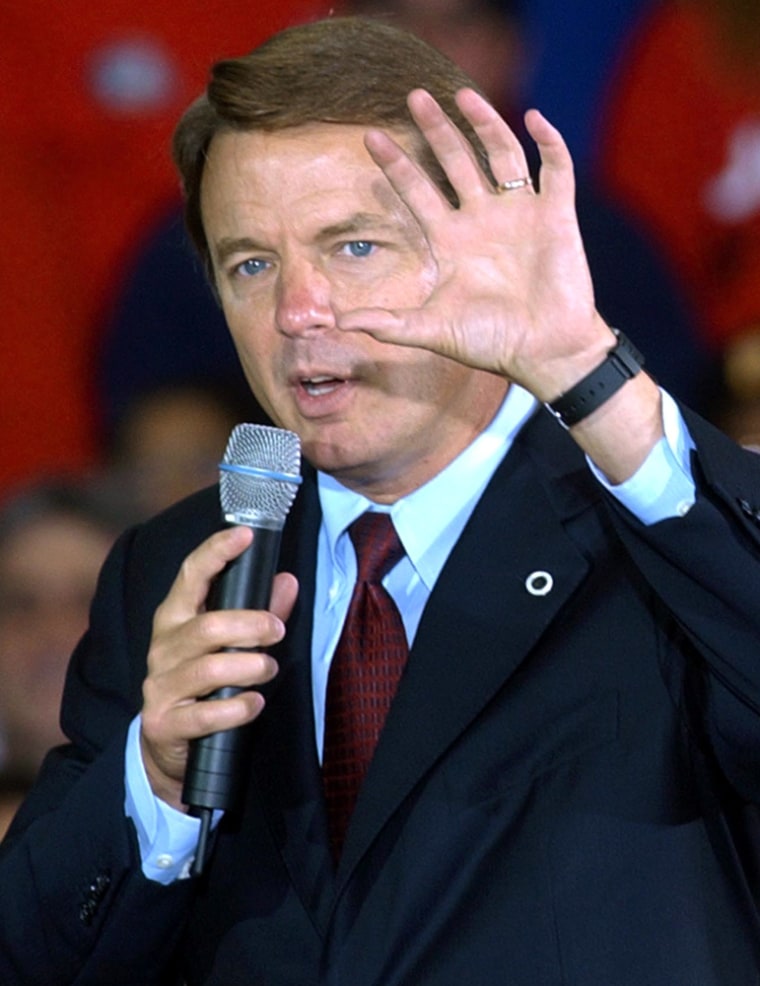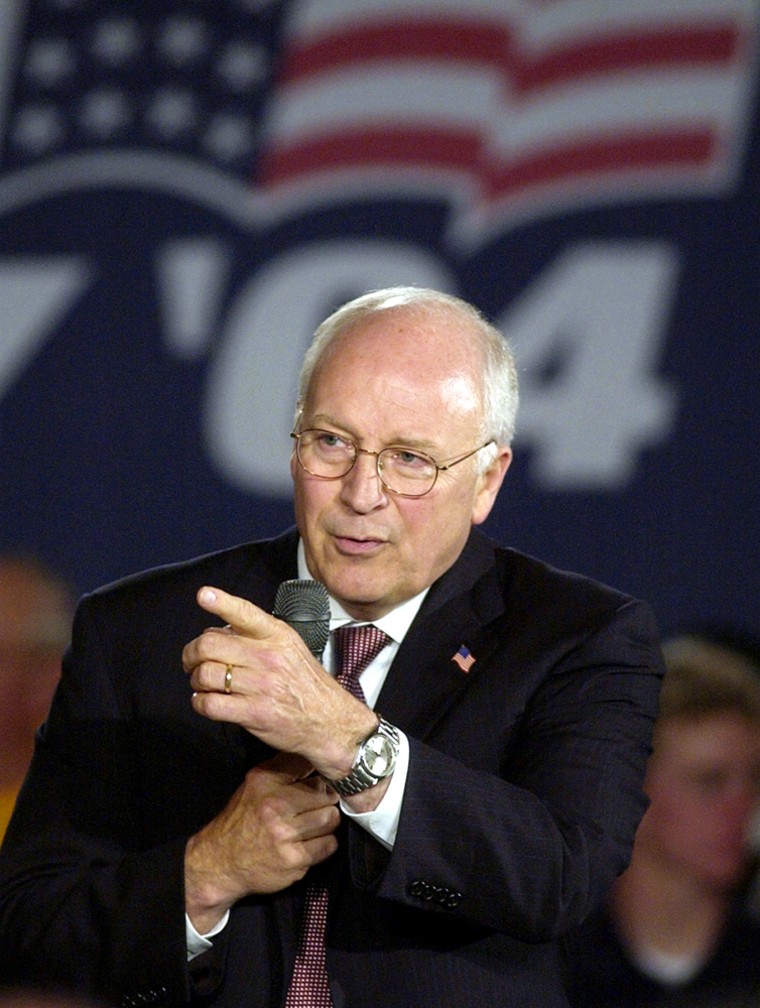Tomorrow's vice presidential debate, which both campaigns once presumed would be a sideshow to the presidential race, has assumed critical importance, with Republicans depending on Vice President Cheney to halt the ticket's slide in momentum.
After what Republicans acknowledge was President Bush's faltering performance in his televised encounter with Democratic nominee John F. Kerry, GOP strategists said Cheney's aim is to return public attention to the Sept. 11, 2001, attacks and the administration's broader handling of the terrorism threat and away from what they called a "second-guessing" debate over the decision to invade Iraq.
A Republican official involved in Cheney's preparation for his encounter with Sen. John Edwards (N.C.) said the vice president will try to bring fresh attention to the themes "that shoot out of the 9/11 set of memories and issues — preparedness, safety and homeland security."
Kerry's aides are hoping that at the debate in Cleveland, Edwards will summon his skills as a trial lawyer to cast Cheney as the architect of the administration's worst policy judgments, as well as a symbol of corporate excess because of his former position as chief executive of Halliburton, which has received huge Iraq contracts but also faced accusations of improper billing there.
Clash of styles, substance
Vice presidential debates historically have not been consequential in presidential contests, but strategists with both parties say the timing and personalities of this one could make it an exception. American politics in recent decades has rarely offered a more vivid stylistic and substantive contrast than Cheney, 63, and Edwards, 51.
The Republican is a balding, gruff veteran of GOP administrations and the corporate boardroom. The Democrat is a newcomer with news-anchor hair and a personal fortune and political reputation made by theatrical attacks against powerful interests in the courtroom and on the campaign trail.
Both sides have given indications that they are a bit spooked by the potential strengths of the other. During negotiations over the debates, the Bush-Cheney team rejected a "town meeting" format for the vice presidential debate. Republicans feared such a format would allow Edwards to walk about like a lawyer giving a closing statement and maximize his presumed skill in engaging with ordinary voters. Instead, the two men will sit at a desk with a moderator, just as Cheney and Sen. Joseph I. Lieberman (D-Conn.) did in the vice presidential debate four years ago.
Tad Devine, a Kerry consultant, said this format was one of the concessions the Democratic side made in exchange for Bush's side agreeing to three presidential debates.
Cheney cool, articulate
Cheney does not lack for advantages of his own. Although he is hardly a charismatic politician in the traditional sense, he has some skills that make him well suited for television. These include an articulate command of issues that Democrats acknowledge is superior to that of Edwards, as well as a cool and subdued style that allows him to score even tough points in a conversational style.
"He doesn't have the option of being the nice guy that he was in the 2000 debate," a Democratic official involved in debate preparation said. "He has to really come out swinging."
Perhaps, but Cheney has often proved elusive for Democrats. In 2000, according to someone who helped Lieberman prepare, the senator assumed that Cheney would play the traditional vice presidential candidate attack role. When Cheney was a model of civility, Lieberman was left unprepared to score his points and lost much of the edge, this person said.
Edwards aims to reassure voters
Edwards's advisers said his principal aim has always been to validate his selection by Kerry and reassure viewers that he has the seasoning and knowledge for the job, despite a government résumé limited to one term in the Senate. They said last week's debate gives Edwards a unique opportunity to amplify the case Kerry made about the Iraq invasion being a "colossal error" and also shift the campaign conversation toward domestic policy issues, where Democrats historically run stronger.

Cheney and Edwards were cloistered in debate practice yesterday, after weeks of preparation. Cheney is at his home near Jackson, Wyo., and enlisted Rep. Rob Portman (Ohio) to play his sparring partner, just as he did in 2000. Edwards has retreated to historic Chautauqua, N.Y., settling in at the same 19th- century resort where President Bill Clinton practiced for a 1996 debate against Republican Robert J. Dole. Washington lawyer Bob Barnett is repeating his 2000 role, playing Cheney in practice sessions with Edwards.
Both men with much to prove
Beyond the implications for the Nov. 2 election, both men have much to prove for the sake of their personal reputations.
Cheney is said by friends to have been furious about months of speculation — never accurate, by all insider accounts — that Bush was weighing whether to drop him from the ticket, and he is eager to address the criticism that gave rise to the speculation.
"The debate is a chance for Cheney to vindicate the decision to pick him in the first place and to give him the wide-ranging authority he has had during this administration," said a friend who talks often to Cheney. "He needs to halt the energy that the Kerry ticket got out of the first debate, and if he does that, it will provide a lot of balance to the negatives that are associated with Cheney's involvement in Halliburton."
The H-word is indeed likely to be heard from Edwards, as it has been on the campaign trail. Howard Wolfson, a Democratic National Committee adviser, predicted a tough indictment from Edwards on Halliburton, which he called "a one-word answer to a lot of questions, and a symbol of corporate malfeasance, crony capitalism and poor planning in Iraq."
Focus on preemption
On Iraq, a Cheney adviser said, the vice president wants to recast the debate away from Kerry's emphasis on judgments that proved wrong — such as the suspected presence of weapons of mass destruction or the prediction that the postwar occupation would be marked by welcoming Iraqis — toward Bush's emphasis, which is that in the wake of Sept. 11 the nation must move preemptively to confront potential threats. Cheney is going to remind people that "preemptive war is not something you do for fun — it was based on a view of real threats," said the official involved in Cheney's preparation.
Edwards, too, has something to prove. Some senior Democrats have grumbled that he has not been the aggressive advocate for Kerry on the campaign trail that they had hoped, unwilling until recently to throw the rough punches that are often assigned to running mates. Moreover, for all the brio he brings to his well-practiced stump speech, Edwards is not always effective in spontaneous settings, such as during NBC's "Meet the Press" when he gave a middling performance last year as a presidential candidate.
Edwards is leaving the Senate at the end of his term. This leaves the 90 minutes at Case Western Reserve University as a golden opportunity — and arguably sole opportunity — to prove that Kerry made the right choice of running mate if the ticket wins, or to set Edwards up for another presidential run if Democrats fall short next month.
